Business Ethics Reflexive Journal: A Journey of Ethical Perspectives
VerifiedAdded on 2023/06/09
|13
|4168
|341
Journal and Reflective Writing
AI Summary
This reflexive journal explores various aspects of business ethics, ethical decision-making, and the application of ethical perspectives in organizational settings. It delves into theories such as utilitarianism, Kant's categorical imperative, Rawl's theory of justice, and Confucianism, examining their strengths and weaknesses in practical application. The journal also reflects on personal ethical principles like morality, equality, and self-sufficiency, and how these principles guide decision-making in both personal and professional contexts. Furthermore, it discusses the importance of aligning personal values with organizational goals and the role of implicit theories of morality in shaping ethical behavior. The journal concludes with a reflection on the journey undertaken throughout the business ethics course and how it has influenced the author's ethical perspectives. A case study is presented to further illustrate the practical application of ethical principles in real-world scenarios. Desklib offers similar solved assignments and past papers for students.
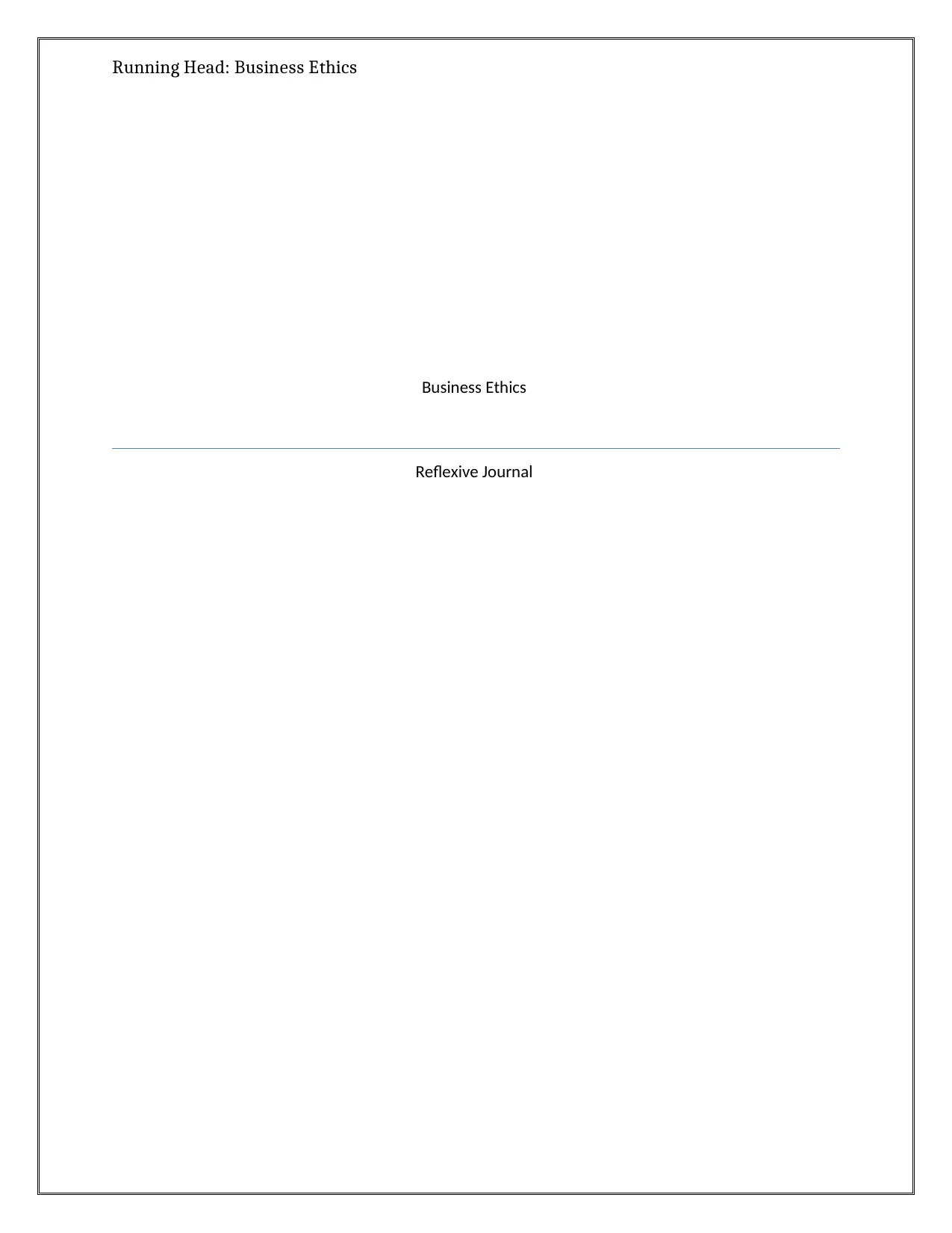
Running Head: Business Ethics
Business Ethics
Reflexive Journal
Business Ethics
Reflexive Journal
Paraphrase This Document
Need a fresh take? Get an instant paraphrase of this document with our AI Paraphraser
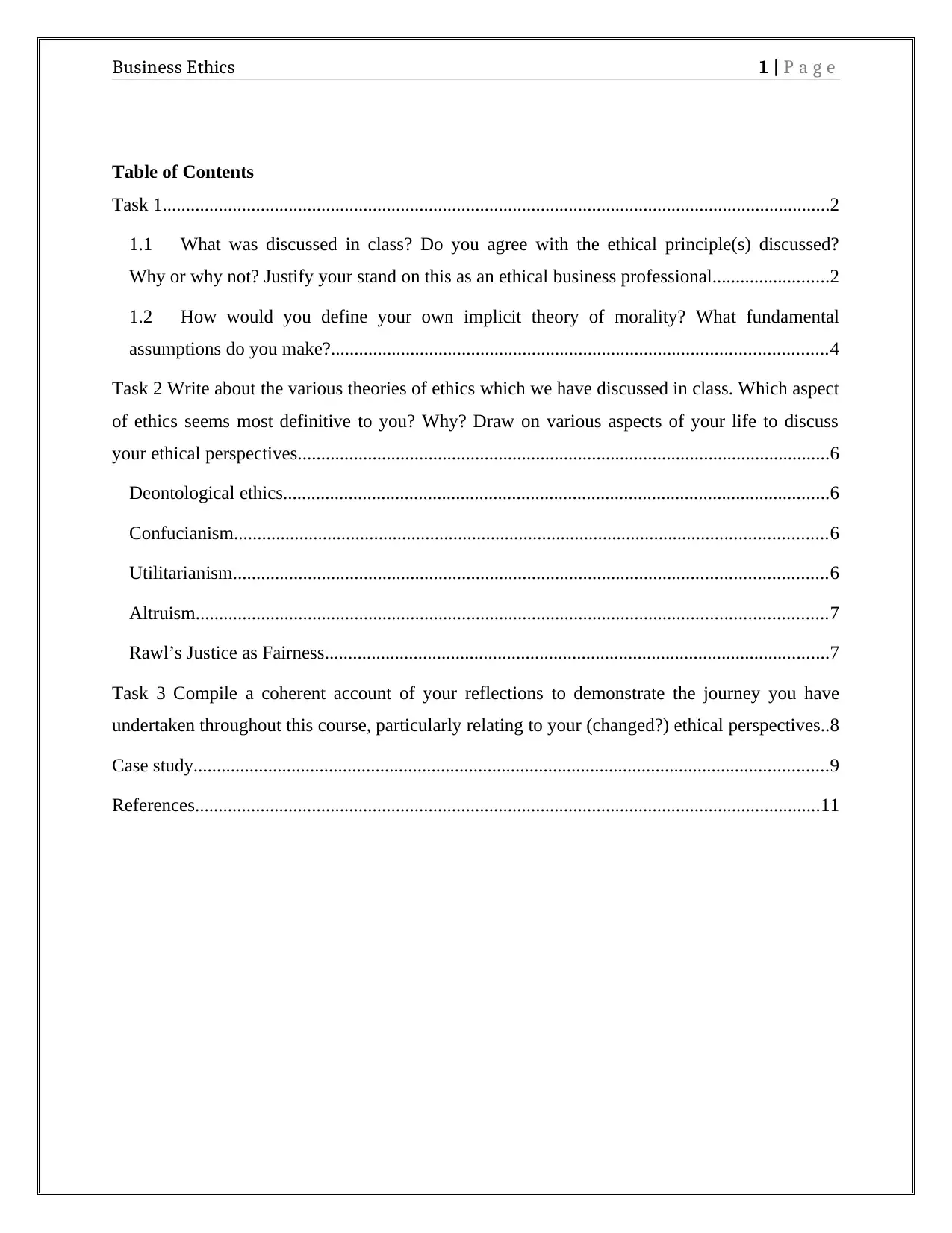
Business Ethics 1 | P a g e
Table of Contents
Task 1...............................................................................................................................................2
1.1 What was discussed in class? Do you agree with the ethical principle(s) discussed?
Why or why not? Justify your stand on this as an ethical business professional.........................2
1.2 How would you define your own implicit theory of morality? What fundamental
assumptions do you make?..........................................................................................................4
Task 2 Write about the various theories of ethics which we have discussed in class. Which aspect
of ethics seems most definitive to you? Why? Draw on various aspects of your life to discuss
your ethical perspectives..................................................................................................................6
Deontological ethics.....................................................................................................................6
Confucianism...............................................................................................................................6
Utilitarianism...............................................................................................................................6
Altruism.......................................................................................................................................7
Rawl’s Justice as Fairness............................................................................................................7
Task 3 Compile a coherent account of your reflections to demonstrate the journey you have
undertaken throughout this course, particularly relating to your (changed?) ethical perspectives..8
Case study........................................................................................................................................9
References......................................................................................................................................11
Table of Contents
Task 1...............................................................................................................................................2
1.1 What was discussed in class? Do you agree with the ethical principle(s) discussed?
Why or why not? Justify your stand on this as an ethical business professional.........................2
1.2 How would you define your own implicit theory of morality? What fundamental
assumptions do you make?..........................................................................................................4
Task 2 Write about the various theories of ethics which we have discussed in class. Which aspect
of ethics seems most definitive to you? Why? Draw on various aspects of your life to discuss
your ethical perspectives..................................................................................................................6
Deontological ethics.....................................................................................................................6
Confucianism...............................................................................................................................6
Utilitarianism...............................................................................................................................6
Altruism.......................................................................................................................................7
Rawl’s Justice as Fairness............................................................................................................7
Task 3 Compile a coherent account of your reflections to demonstrate the journey you have
undertaken throughout this course, particularly relating to your (changed?) ethical perspectives..8
Case study........................................................................................................................................9
References......................................................................................................................................11
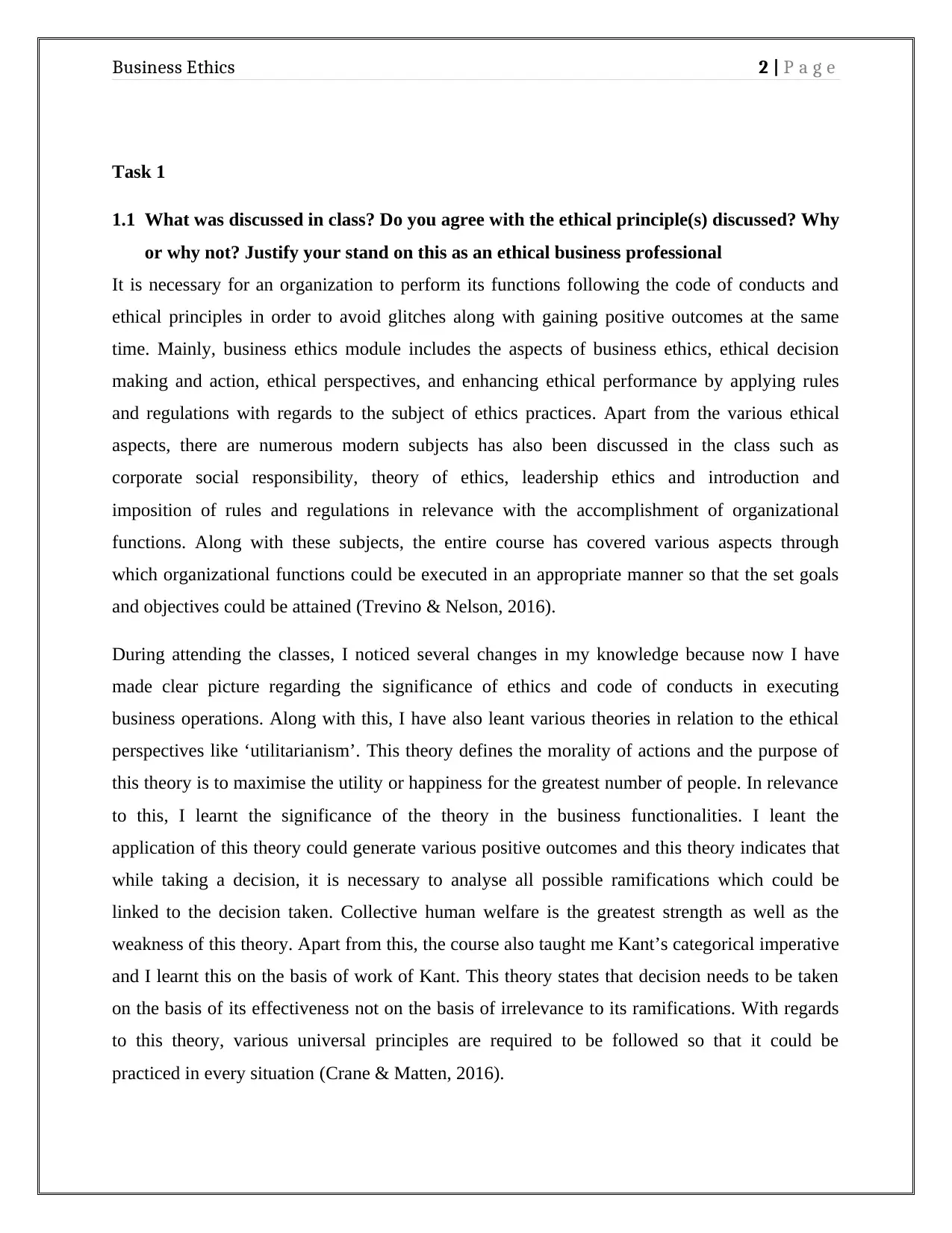
Business Ethics 2 | P a g e
Task 1
1.1 What was discussed in class? Do you agree with the ethical principle(s) discussed? Why
or why not? Justify your stand on this as an ethical business professional
It is necessary for an organization to perform its functions following the code of conducts and
ethical principles in order to avoid glitches along with gaining positive outcomes at the same
time. Mainly, business ethics module includes the aspects of business ethics, ethical decision
making and action, ethical perspectives, and enhancing ethical performance by applying rules
and regulations with regards to the subject of ethics practices. Apart from the various ethical
aspects, there are numerous modern subjects has also been discussed in the class such as
corporate social responsibility, theory of ethics, leadership ethics and introduction and
imposition of rules and regulations in relevance with the accomplishment of organizational
functions. Along with these subjects, the entire course has covered various aspects through
which organizational functions could be executed in an appropriate manner so that the set goals
and objectives could be attained (Trevino & Nelson, 2016).
During attending the classes, I noticed several changes in my knowledge because now I have
made clear picture regarding the significance of ethics and code of conducts in executing
business operations. Along with this, I have also leant various theories in relation to the ethical
perspectives like ‘utilitarianism’. This theory defines the morality of actions and the purpose of
this theory is to maximise the utility or happiness for the greatest number of people. In relevance
to this, I learnt the significance of the theory in the business functionalities. I leant the
application of this theory could generate various positive outcomes and this theory indicates that
while taking a decision, it is necessary to analyse all possible ramifications which could be
linked to the decision taken. Collective human welfare is the greatest strength as well as the
weakness of this theory. Apart from this, the course also taught me Kant’s categorical imperative
and I learnt this on the basis of work of Kant. This theory states that decision needs to be taken
on the basis of its effectiveness not on the basis of irrelevance to its ramifications. With regards
to this theory, various universal principles are required to be followed so that it could be
practiced in every situation (Crane & Matten, 2016).
Task 1
1.1 What was discussed in class? Do you agree with the ethical principle(s) discussed? Why
or why not? Justify your stand on this as an ethical business professional
It is necessary for an organization to perform its functions following the code of conducts and
ethical principles in order to avoid glitches along with gaining positive outcomes at the same
time. Mainly, business ethics module includes the aspects of business ethics, ethical decision
making and action, ethical perspectives, and enhancing ethical performance by applying rules
and regulations with regards to the subject of ethics practices. Apart from the various ethical
aspects, there are numerous modern subjects has also been discussed in the class such as
corporate social responsibility, theory of ethics, leadership ethics and introduction and
imposition of rules and regulations in relevance with the accomplishment of organizational
functions. Along with these subjects, the entire course has covered various aspects through
which organizational functions could be executed in an appropriate manner so that the set goals
and objectives could be attained (Trevino & Nelson, 2016).
During attending the classes, I noticed several changes in my knowledge because now I have
made clear picture regarding the significance of ethics and code of conducts in executing
business operations. Along with this, I have also leant various theories in relation to the ethical
perspectives like ‘utilitarianism’. This theory defines the morality of actions and the purpose of
this theory is to maximise the utility or happiness for the greatest number of people. In relevance
to this, I learnt the significance of the theory in the business functionalities. I leant the
application of this theory could generate various positive outcomes and this theory indicates that
while taking a decision, it is necessary to analyse all possible ramifications which could be
linked to the decision taken. Collective human welfare is the greatest strength as well as the
weakness of this theory. Apart from this, the course also taught me Kant’s categorical imperative
and I learnt this on the basis of work of Kant. This theory states that decision needs to be taken
on the basis of its effectiveness not on the basis of irrelevance to its ramifications. With regards
to this theory, various universal principles are required to be followed so that it could be
practiced in every situation (Crane & Matten, 2016).
⊘ This is a preview!⊘
Do you want full access?
Subscribe today to unlock all pages.

Trusted by 1+ million students worldwide
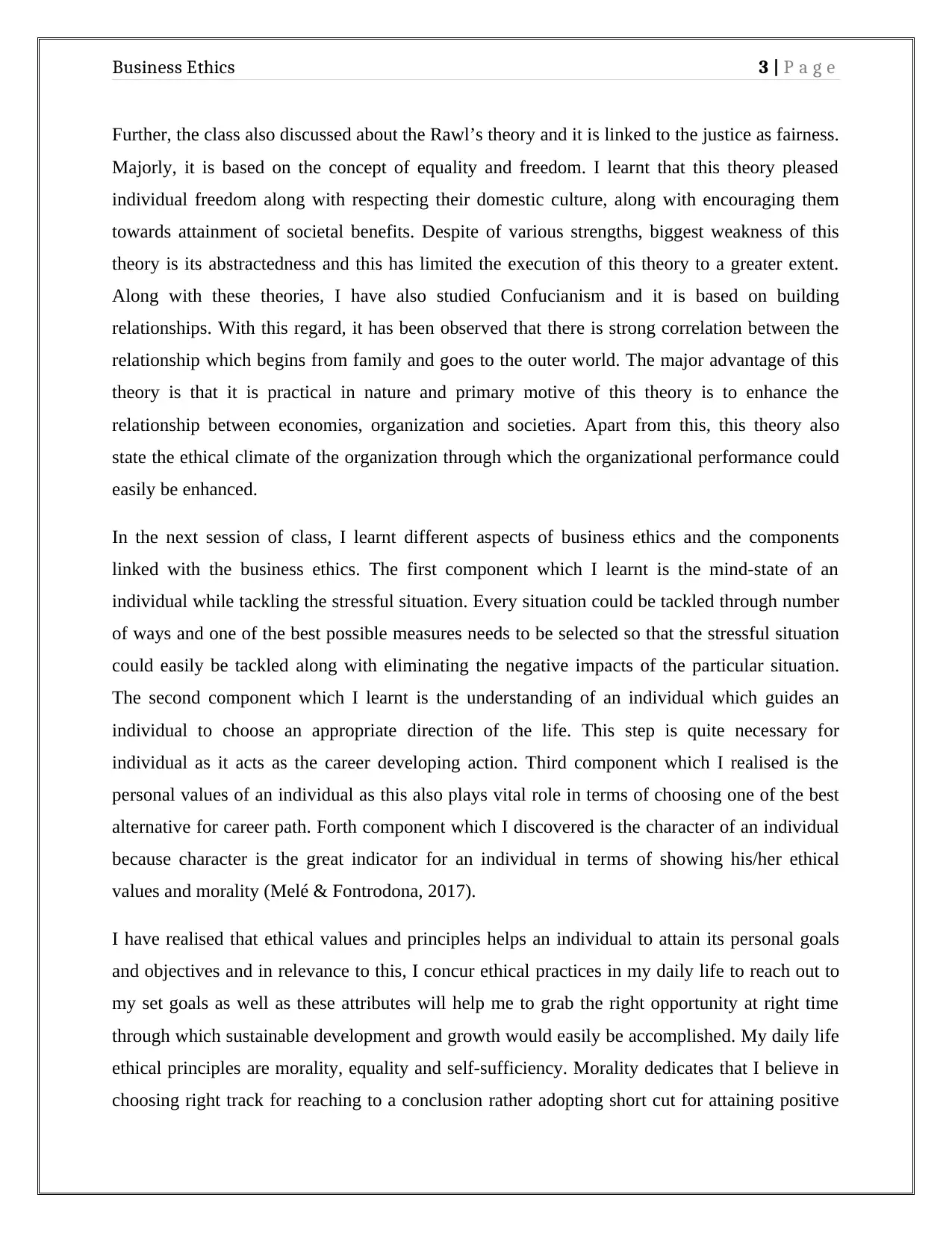
Business Ethics 3 | P a g e
Further, the class also discussed about the Rawl’s theory and it is linked to the justice as fairness.
Majorly, it is based on the concept of equality and freedom. I learnt that this theory pleased
individual freedom along with respecting their domestic culture, along with encouraging them
towards attainment of societal benefits. Despite of various strengths, biggest weakness of this
theory is its abstractedness and this has limited the execution of this theory to a greater extent.
Along with these theories, I have also studied Confucianism and it is based on building
relationships. With this regard, it has been observed that there is strong correlation between the
relationship which begins from family and goes to the outer world. The major advantage of this
theory is that it is practical in nature and primary motive of this theory is to enhance the
relationship between economies, organization and societies. Apart from this, this theory also
state the ethical climate of the organization through which the organizational performance could
easily be enhanced.
In the next session of class, I learnt different aspects of business ethics and the components
linked with the business ethics. The first component which I learnt is the mind-state of an
individual while tackling the stressful situation. Every situation could be tackled through number
of ways and one of the best possible measures needs to be selected so that the stressful situation
could easily be tackled along with eliminating the negative impacts of the particular situation.
The second component which I learnt is the understanding of an individual which guides an
individual to choose an appropriate direction of the life. This step is quite necessary for
individual as it acts as the career developing action. Third component which I realised is the
personal values of an individual as this also plays vital role in terms of choosing one of the best
alternative for career path. Forth component which I discovered is the character of an individual
because character is the great indicator for an individual in terms of showing his/her ethical
values and morality (Melé & Fontrodona, 2017).
I have realised that ethical values and principles helps an individual to attain its personal goals
and objectives and in relevance to this, I concur ethical practices in my daily life to reach out to
my set goals as well as these attributes will help me to grab the right opportunity at right time
through which sustainable development and growth would easily be accomplished. My daily life
ethical principles are morality, equality and self-sufficiency. Morality dedicates that I believe in
choosing right track for reaching to a conclusion rather adopting short cut for attaining positive
Further, the class also discussed about the Rawl’s theory and it is linked to the justice as fairness.
Majorly, it is based on the concept of equality and freedom. I learnt that this theory pleased
individual freedom along with respecting their domestic culture, along with encouraging them
towards attainment of societal benefits. Despite of various strengths, biggest weakness of this
theory is its abstractedness and this has limited the execution of this theory to a greater extent.
Along with these theories, I have also studied Confucianism and it is based on building
relationships. With this regard, it has been observed that there is strong correlation between the
relationship which begins from family and goes to the outer world. The major advantage of this
theory is that it is practical in nature and primary motive of this theory is to enhance the
relationship between economies, organization and societies. Apart from this, this theory also
state the ethical climate of the organization through which the organizational performance could
easily be enhanced.
In the next session of class, I learnt different aspects of business ethics and the components
linked with the business ethics. The first component which I learnt is the mind-state of an
individual while tackling the stressful situation. Every situation could be tackled through number
of ways and one of the best possible measures needs to be selected so that the stressful situation
could easily be tackled along with eliminating the negative impacts of the particular situation.
The second component which I learnt is the understanding of an individual which guides an
individual to choose an appropriate direction of the life. This step is quite necessary for
individual as it acts as the career developing action. Third component which I realised is the
personal values of an individual as this also plays vital role in terms of choosing one of the best
alternative for career path. Forth component which I discovered is the character of an individual
because character is the great indicator for an individual in terms of showing his/her ethical
values and morality (Melé & Fontrodona, 2017).
I have realised that ethical values and principles helps an individual to attain its personal goals
and objectives and in relevance to this, I concur ethical practices in my daily life to reach out to
my set goals as well as these attributes will help me to grab the right opportunity at right time
through which sustainable development and growth would easily be accomplished. My daily life
ethical principles are morality, equality and self-sufficiency. Morality dedicates that I believe in
choosing right track for reaching to a conclusion rather adopting short cut for attaining positive
Paraphrase This Document
Need a fresh take? Get an instant paraphrase of this document with our AI Paraphraser
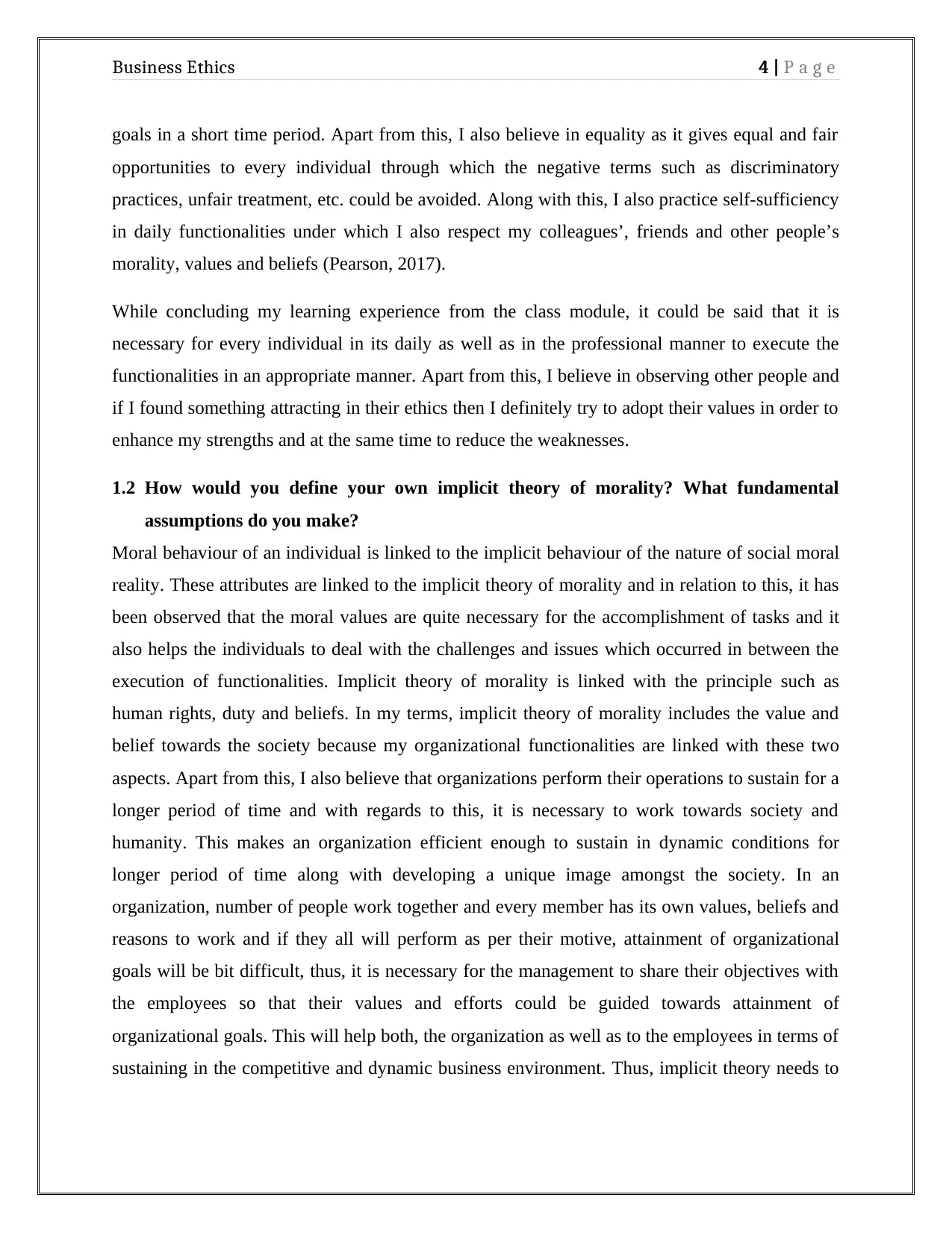
Business Ethics 4 | P a g e
goals in a short time period. Apart from this, I also believe in equality as it gives equal and fair
opportunities to every individual through which the negative terms such as discriminatory
practices, unfair treatment, etc. could be avoided. Along with this, I also practice self-sufficiency
in daily functionalities under which I also respect my colleagues’, friends and other people’s
morality, values and beliefs (Pearson, 2017).
While concluding my learning experience from the class module, it could be said that it is
necessary for every individual in its daily as well as in the professional manner to execute the
functionalities in an appropriate manner. Apart from this, I believe in observing other people and
if I found something attracting in their ethics then I definitely try to adopt their values in order to
enhance my strengths and at the same time to reduce the weaknesses.
1.2 How would you define your own implicit theory of morality? What fundamental
assumptions do you make?
Moral behaviour of an individual is linked to the implicit behaviour of the nature of social moral
reality. These attributes are linked to the implicit theory of morality and in relation to this, it has
been observed that the moral values are quite necessary for the accomplishment of tasks and it
also helps the individuals to deal with the challenges and issues which occurred in between the
execution of functionalities. Implicit theory of morality is linked with the principle such as
human rights, duty and beliefs. In my terms, implicit theory of morality includes the value and
belief towards the society because my organizational functionalities are linked with these two
aspects. Apart from this, I also believe that organizations perform their operations to sustain for a
longer period of time and with regards to this, it is necessary to work towards society and
humanity. This makes an organization efficient enough to sustain in dynamic conditions for
longer period of time along with developing a unique image amongst the society. In an
organization, number of people work together and every member has its own values, beliefs and
reasons to work and if they all will perform as per their motive, attainment of organizational
goals will be bit difficult, thus, it is necessary for the management to share their objectives with
the employees so that their values and efforts could be guided towards attainment of
organizational goals. This will help both, the organization as well as to the employees in terms of
sustaining in the competitive and dynamic business environment. Thus, implicit theory needs to
goals in a short time period. Apart from this, I also believe in equality as it gives equal and fair
opportunities to every individual through which the negative terms such as discriminatory
practices, unfair treatment, etc. could be avoided. Along with this, I also practice self-sufficiency
in daily functionalities under which I also respect my colleagues’, friends and other people’s
morality, values and beliefs (Pearson, 2017).
While concluding my learning experience from the class module, it could be said that it is
necessary for every individual in its daily as well as in the professional manner to execute the
functionalities in an appropriate manner. Apart from this, I believe in observing other people and
if I found something attracting in their ethics then I definitely try to adopt their values in order to
enhance my strengths and at the same time to reduce the weaknesses.
1.2 How would you define your own implicit theory of morality? What fundamental
assumptions do you make?
Moral behaviour of an individual is linked to the implicit behaviour of the nature of social moral
reality. These attributes are linked to the implicit theory of morality and in relation to this, it has
been observed that the moral values are quite necessary for the accomplishment of tasks and it
also helps the individuals to deal with the challenges and issues which occurred in between the
execution of functionalities. Implicit theory of morality is linked with the principle such as
human rights, duty and beliefs. In my terms, implicit theory of morality includes the value and
belief towards the society because my organizational functionalities are linked with these two
aspects. Apart from this, I also believe that organizations perform their operations to sustain for a
longer period of time and with regards to this, it is necessary to work towards society and
humanity. This makes an organization efficient enough to sustain in dynamic conditions for
longer period of time along with developing a unique image amongst the society. In an
organization, number of people work together and every member has its own values, beliefs and
reasons to work and if they all will perform as per their motive, attainment of organizational
goals will be bit difficult, thus, it is necessary for the management to share their objectives with
the employees so that their values and efforts could be guided towards attainment of
organizational goals. This will help both, the organization as well as to the employees in terms of
sustaining in the competitive and dynamic business environment. Thus, implicit theory needs to
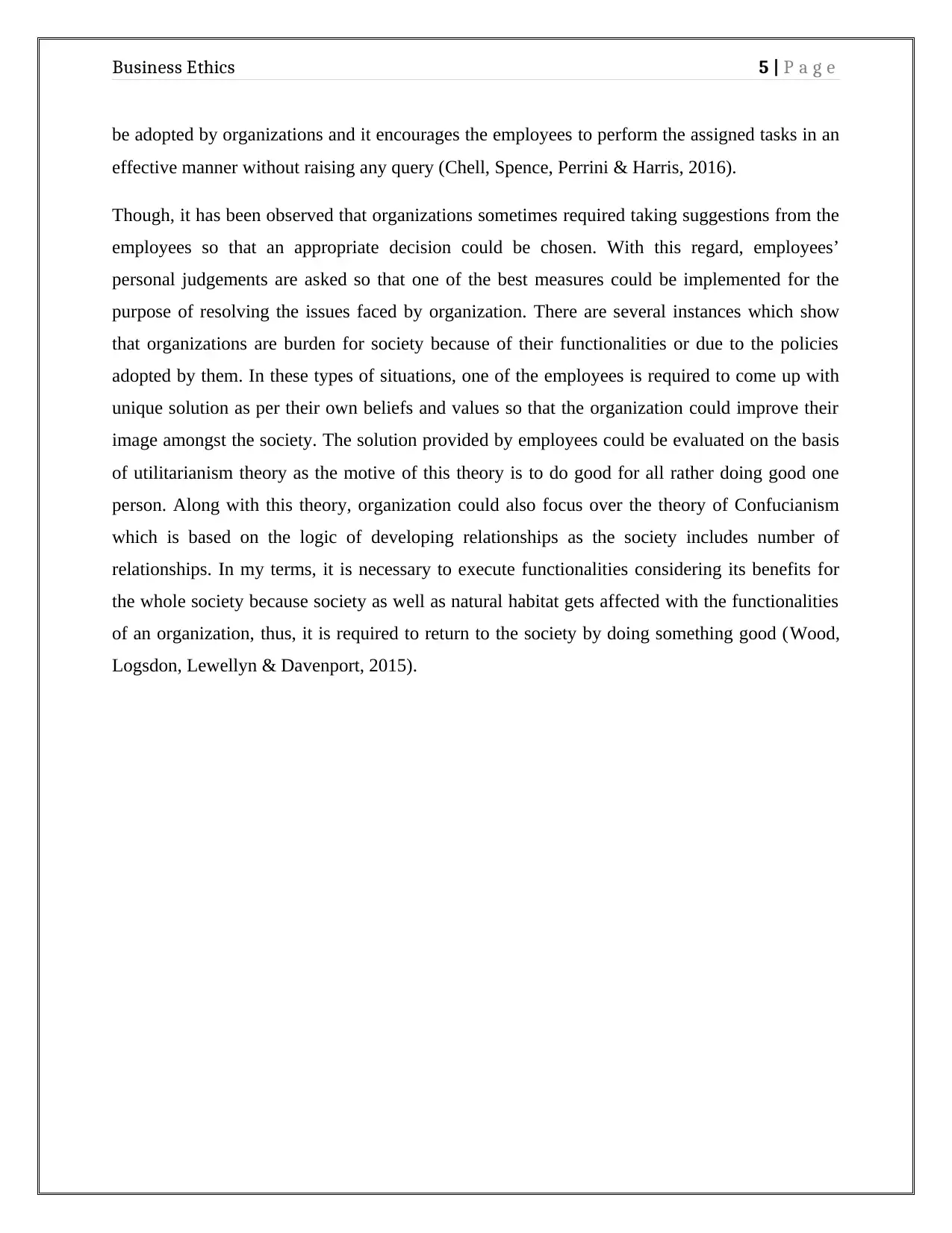
Business Ethics 5 | P a g e
be adopted by organizations and it encourages the employees to perform the assigned tasks in an
effective manner without raising any query (Chell, Spence, Perrini & Harris, 2016).
Though, it has been observed that organizations sometimes required taking suggestions from the
employees so that an appropriate decision could be chosen. With this regard, employees’
personal judgements are asked so that one of the best measures could be implemented for the
purpose of resolving the issues faced by organization. There are several instances which show
that organizations are burden for society because of their functionalities or due to the policies
adopted by them. In these types of situations, one of the employees is required to come up with
unique solution as per their own beliefs and values so that the organization could improve their
image amongst the society. The solution provided by employees could be evaluated on the basis
of utilitarianism theory as the motive of this theory is to do good for all rather doing good one
person. Along with this theory, organization could also focus over the theory of Confucianism
which is based on the logic of developing relationships as the society includes number of
relationships. In my terms, it is necessary to execute functionalities considering its benefits for
the whole society because society as well as natural habitat gets affected with the functionalities
of an organization, thus, it is required to return to the society by doing something good (Wood,
Logsdon, Lewellyn & Davenport, 2015).
be adopted by organizations and it encourages the employees to perform the assigned tasks in an
effective manner without raising any query (Chell, Spence, Perrini & Harris, 2016).
Though, it has been observed that organizations sometimes required taking suggestions from the
employees so that an appropriate decision could be chosen. With this regard, employees’
personal judgements are asked so that one of the best measures could be implemented for the
purpose of resolving the issues faced by organization. There are several instances which show
that organizations are burden for society because of their functionalities or due to the policies
adopted by them. In these types of situations, one of the employees is required to come up with
unique solution as per their own beliefs and values so that the organization could improve their
image amongst the society. The solution provided by employees could be evaluated on the basis
of utilitarianism theory as the motive of this theory is to do good for all rather doing good one
person. Along with this theory, organization could also focus over the theory of Confucianism
which is based on the logic of developing relationships as the society includes number of
relationships. In my terms, it is necessary to execute functionalities considering its benefits for
the whole society because society as well as natural habitat gets affected with the functionalities
of an organization, thus, it is required to return to the society by doing something good (Wood,
Logsdon, Lewellyn & Davenport, 2015).
⊘ This is a preview!⊘
Do you want full access?
Subscribe today to unlock all pages.

Trusted by 1+ million students worldwide
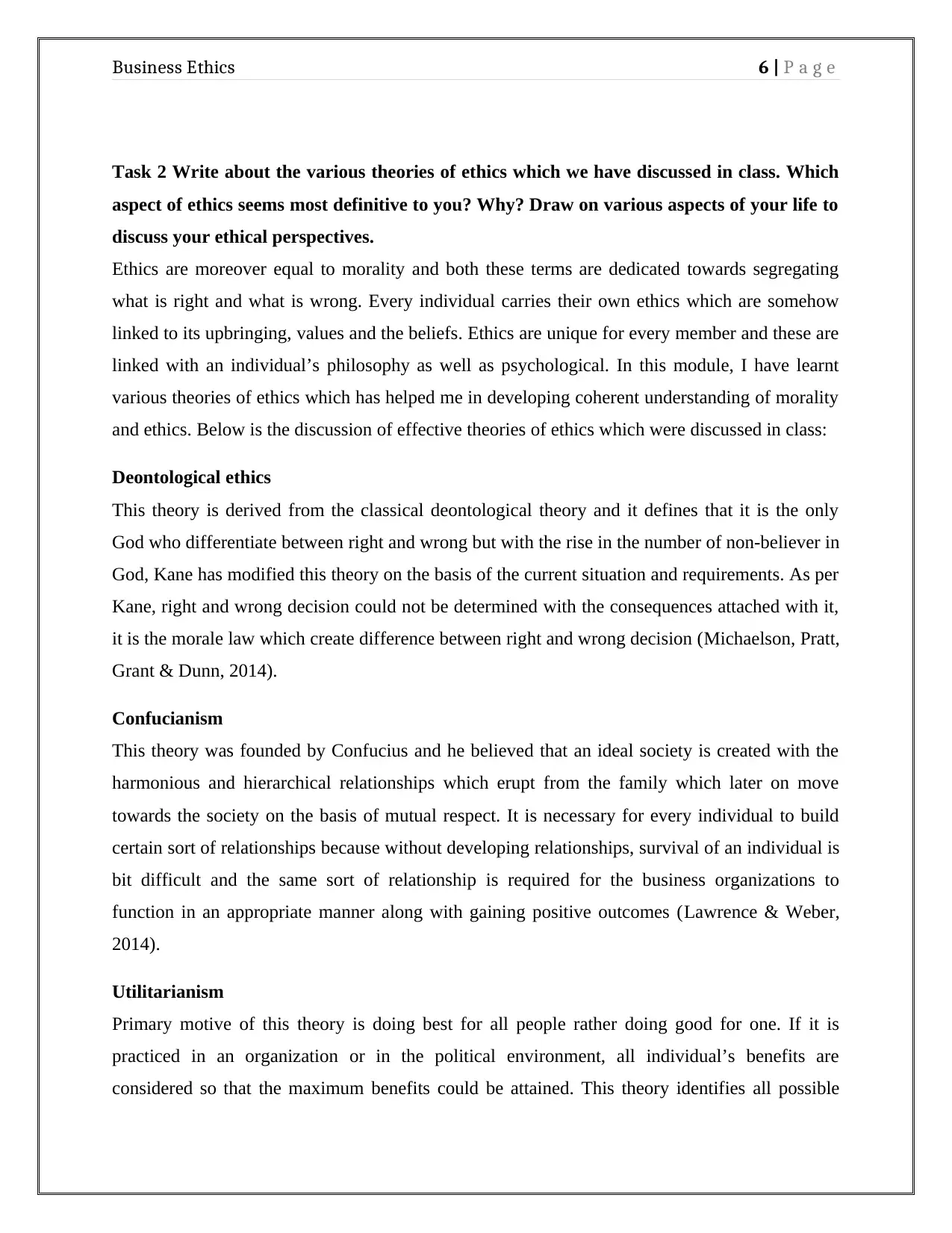
Business Ethics 6 | P a g e
Task 2 Write about the various theories of ethics which we have discussed in class. Which
aspect of ethics seems most definitive to you? Why? Draw on various aspects of your life to
discuss your ethical perspectives.
Ethics are moreover equal to morality and both these terms are dedicated towards segregating
what is right and what is wrong. Every individual carries their own ethics which are somehow
linked to its upbringing, values and the beliefs. Ethics are unique for every member and these are
linked with an individual’s philosophy as well as psychological. In this module, I have learnt
various theories of ethics which has helped me in developing coherent understanding of morality
and ethics. Below is the discussion of effective theories of ethics which were discussed in class:
Deontological ethics
This theory is derived from the classical deontological theory and it defines that it is the only
God who differentiate between right and wrong but with the rise in the number of non-believer in
God, Kane has modified this theory on the basis of the current situation and requirements. As per
Kane, right and wrong decision could not be determined with the consequences attached with it,
it is the morale law which create difference between right and wrong decision (Michaelson, Pratt,
Grant & Dunn, 2014).
Confucianism
This theory was founded by Confucius and he believed that an ideal society is created with the
harmonious and hierarchical relationships which erupt from the family which later on move
towards the society on the basis of mutual respect. It is necessary for every individual to build
certain sort of relationships because without developing relationships, survival of an individual is
bit difficult and the same sort of relationship is required for the business organizations to
function in an appropriate manner along with gaining positive outcomes (Lawrence & Weber,
2014).
Utilitarianism
Primary motive of this theory is doing best for all people rather doing good for one. If it is
practiced in an organization or in the political environment, all individual’s benefits are
considered so that the maximum benefits could be attained. This theory identifies all possible
Task 2 Write about the various theories of ethics which we have discussed in class. Which
aspect of ethics seems most definitive to you? Why? Draw on various aspects of your life to
discuss your ethical perspectives.
Ethics are moreover equal to morality and both these terms are dedicated towards segregating
what is right and what is wrong. Every individual carries their own ethics which are somehow
linked to its upbringing, values and the beliefs. Ethics are unique for every member and these are
linked with an individual’s philosophy as well as psychological. In this module, I have learnt
various theories of ethics which has helped me in developing coherent understanding of morality
and ethics. Below is the discussion of effective theories of ethics which were discussed in class:
Deontological ethics
This theory is derived from the classical deontological theory and it defines that it is the only
God who differentiate between right and wrong but with the rise in the number of non-believer in
God, Kane has modified this theory on the basis of the current situation and requirements. As per
Kane, right and wrong decision could not be determined with the consequences attached with it,
it is the morale law which create difference between right and wrong decision (Michaelson, Pratt,
Grant & Dunn, 2014).
Confucianism
This theory was founded by Confucius and he believed that an ideal society is created with the
harmonious and hierarchical relationships which erupt from the family which later on move
towards the society on the basis of mutual respect. It is necessary for every individual to build
certain sort of relationships because without developing relationships, survival of an individual is
bit difficult and the same sort of relationship is required for the business organizations to
function in an appropriate manner along with gaining positive outcomes (Lawrence & Weber,
2014).
Utilitarianism
Primary motive of this theory is doing best for all people rather doing good for one. If it is
practiced in an organization or in the political environment, all individual’s benefits are
considered so that the maximum benefits could be attained. This theory identifies all possible
Paraphrase This Document
Need a fresh take? Get an instant paraphrase of this document with our AI Paraphraser
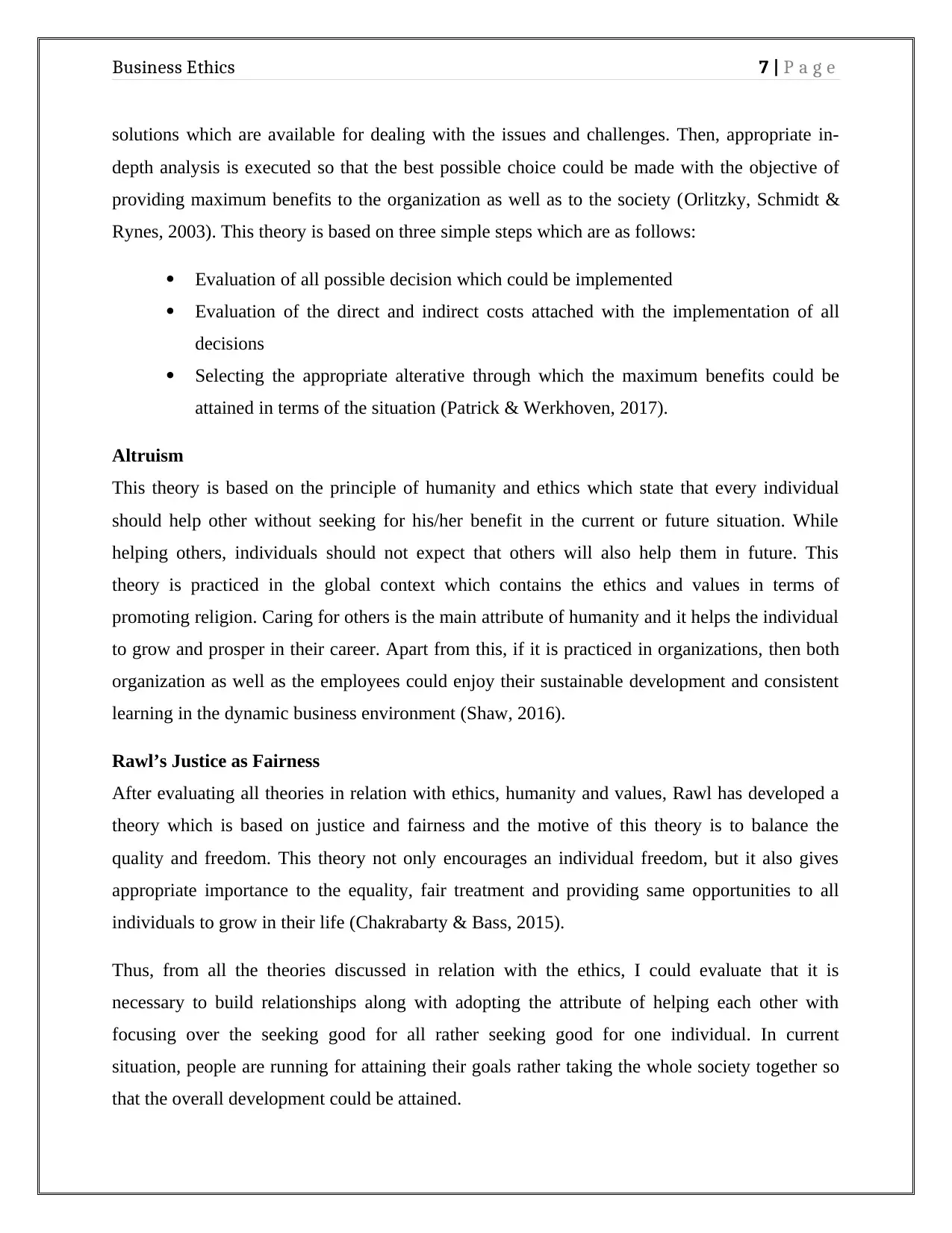
Business Ethics 7 | P a g e
solutions which are available for dealing with the issues and challenges. Then, appropriate in-
depth analysis is executed so that the best possible choice could be made with the objective of
providing maximum benefits to the organization as well as to the society (Orlitzky, Schmidt &
Rynes, 2003). This theory is based on three simple steps which are as follows:
Evaluation of all possible decision which could be implemented
Evaluation of the direct and indirect costs attached with the implementation of all
decisions
Selecting the appropriate alterative through which the maximum benefits could be
attained in terms of the situation (Patrick & Werkhoven, 2017).
Altruism
This theory is based on the principle of humanity and ethics which state that every individual
should help other without seeking for his/her benefit in the current or future situation. While
helping others, individuals should not expect that others will also help them in future. This
theory is practiced in the global context which contains the ethics and values in terms of
promoting religion. Caring for others is the main attribute of humanity and it helps the individual
to grow and prosper in their career. Apart from this, if it is practiced in organizations, then both
organization as well as the employees could enjoy their sustainable development and consistent
learning in the dynamic business environment (Shaw, 2016).
Rawl’s Justice as Fairness
After evaluating all theories in relation with ethics, humanity and values, Rawl has developed a
theory which is based on justice and fairness and the motive of this theory is to balance the
quality and freedom. This theory not only encourages an individual freedom, but it also gives
appropriate importance to the equality, fair treatment and providing same opportunities to all
individuals to grow in their life (Chakrabarty & Bass, 2015).
Thus, from all the theories discussed in relation with the ethics, I could evaluate that it is
necessary to build relationships along with adopting the attribute of helping each other with
focusing over the seeking good for all rather seeking good for one individual. In current
situation, people are running for attaining their goals rather taking the whole society together so
that the overall development could be attained.
solutions which are available for dealing with the issues and challenges. Then, appropriate in-
depth analysis is executed so that the best possible choice could be made with the objective of
providing maximum benefits to the organization as well as to the society (Orlitzky, Schmidt &
Rynes, 2003). This theory is based on three simple steps which are as follows:
Evaluation of all possible decision which could be implemented
Evaluation of the direct and indirect costs attached with the implementation of all
decisions
Selecting the appropriate alterative through which the maximum benefits could be
attained in terms of the situation (Patrick & Werkhoven, 2017).
Altruism
This theory is based on the principle of humanity and ethics which state that every individual
should help other without seeking for his/her benefit in the current or future situation. While
helping others, individuals should not expect that others will also help them in future. This
theory is practiced in the global context which contains the ethics and values in terms of
promoting religion. Caring for others is the main attribute of humanity and it helps the individual
to grow and prosper in their career. Apart from this, if it is practiced in organizations, then both
organization as well as the employees could enjoy their sustainable development and consistent
learning in the dynamic business environment (Shaw, 2016).
Rawl’s Justice as Fairness
After evaluating all theories in relation with ethics, humanity and values, Rawl has developed a
theory which is based on justice and fairness and the motive of this theory is to balance the
quality and freedom. This theory not only encourages an individual freedom, but it also gives
appropriate importance to the equality, fair treatment and providing same opportunities to all
individuals to grow in their life (Chakrabarty & Bass, 2015).
Thus, from all the theories discussed in relation with the ethics, I could evaluate that it is
necessary to build relationships along with adopting the attribute of helping each other with
focusing over the seeking good for all rather seeking good for one individual. In current
situation, people are running for attaining their goals rather taking the whole society together so
that the overall development could be attained.
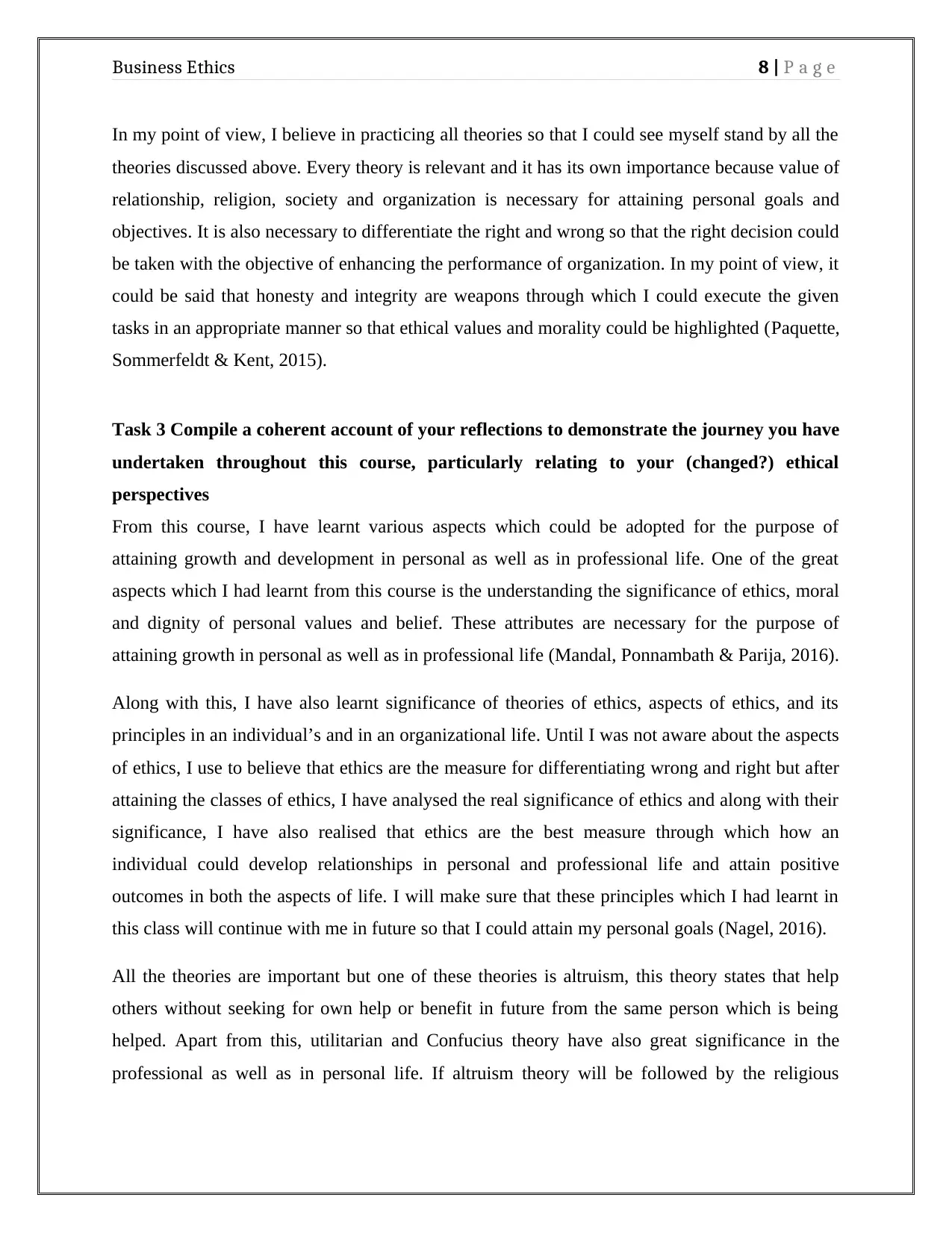
Business Ethics 8 | P a g e
In my point of view, I believe in practicing all theories so that I could see myself stand by all the
theories discussed above. Every theory is relevant and it has its own importance because value of
relationship, religion, society and organization is necessary for attaining personal goals and
objectives. It is also necessary to differentiate the right and wrong so that the right decision could
be taken with the objective of enhancing the performance of organization. In my point of view, it
could be said that honesty and integrity are weapons through which I could execute the given
tasks in an appropriate manner so that ethical values and morality could be highlighted (Paquette,
Sommerfeldt & Kent, 2015).
Task 3 Compile a coherent account of your reflections to demonstrate the journey you have
undertaken throughout this course, particularly relating to your (changed?) ethical
perspectives
From this course, I have learnt various aspects which could be adopted for the purpose of
attaining growth and development in personal as well as in professional life. One of the great
aspects which I had learnt from this course is the understanding the significance of ethics, moral
and dignity of personal values and belief. These attributes are necessary for the purpose of
attaining growth in personal as well as in professional life (Mandal, Ponnambath & Parija, 2016).
Along with this, I have also learnt significance of theories of ethics, aspects of ethics, and its
principles in an individual’s and in an organizational life. Until I was not aware about the aspects
of ethics, I use to believe that ethics are the measure for differentiating wrong and right but after
attaining the classes of ethics, I have analysed the real significance of ethics and along with their
significance, I have also realised that ethics are the best measure through which how an
individual could develop relationships in personal and professional life and attain positive
outcomes in both the aspects of life. I will make sure that these principles which I had learnt in
this class will continue with me in future so that I could attain my personal goals (Nagel, 2016).
All the theories are important but one of these theories is altruism, this theory states that help
others without seeking for own help or benefit in future from the same person which is being
helped. Apart from this, utilitarian and Confucius theory have also great significance in the
professional as well as in personal life. If altruism theory will be followed by the religious
In my point of view, I believe in practicing all theories so that I could see myself stand by all the
theories discussed above. Every theory is relevant and it has its own importance because value of
relationship, religion, society and organization is necessary for attaining personal goals and
objectives. It is also necessary to differentiate the right and wrong so that the right decision could
be taken with the objective of enhancing the performance of organization. In my point of view, it
could be said that honesty and integrity are weapons through which I could execute the given
tasks in an appropriate manner so that ethical values and morality could be highlighted (Paquette,
Sommerfeldt & Kent, 2015).
Task 3 Compile a coherent account of your reflections to demonstrate the journey you have
undertaken throughout this course, particularly relating to your (changed?) ethical
perspectives
From this course, I have learnt various aspects which could be adopted for the purpose of
attaining growth and development in personal as well as in professional life. One of the great
aspects which I had learnt from this course is the understanding the significance of ethics, moral
and dignity of personal values and belief. These attributes are necessary for the purpose of
attaining growth in personal as well as in professional life (Mandal, Ponnambath & Parija, 2016).
Along with this, I have also learnt significance of theories of ethics, aspects of ethics, and its
principles in an individual’s and in an organizational life. Until I was not aware about the aspects
of ethics, I use to believe that ethics are the measure for differentiating wrong and right but after
attaining the classes of ethics, I have analysed the real significance of ethics and along with their
significance, I have also realised that ethics are the best measure through which how an
individual could develop relationships in personal and professional life and attain positive
outcomes in both the aspects of life. I will make sure that these principles which I had learnt in
this class will continue with me in future so that I could attain my personal goals (Nagel, 2016).
All the theories are important but one of these theories is altruism, this theory states that help
others without seeking for own help or benefit in future from the same person which is being
helped. Apart from this, utilitarian and Confucius theory have also great significance in the
professional as well as in personal life. If altruism theory will be followed by the religious
⊘ This is a preview!⊘
Do you want full access?
Subscribe today to unlock all pages.

Trusted by 1+ million students worldwide
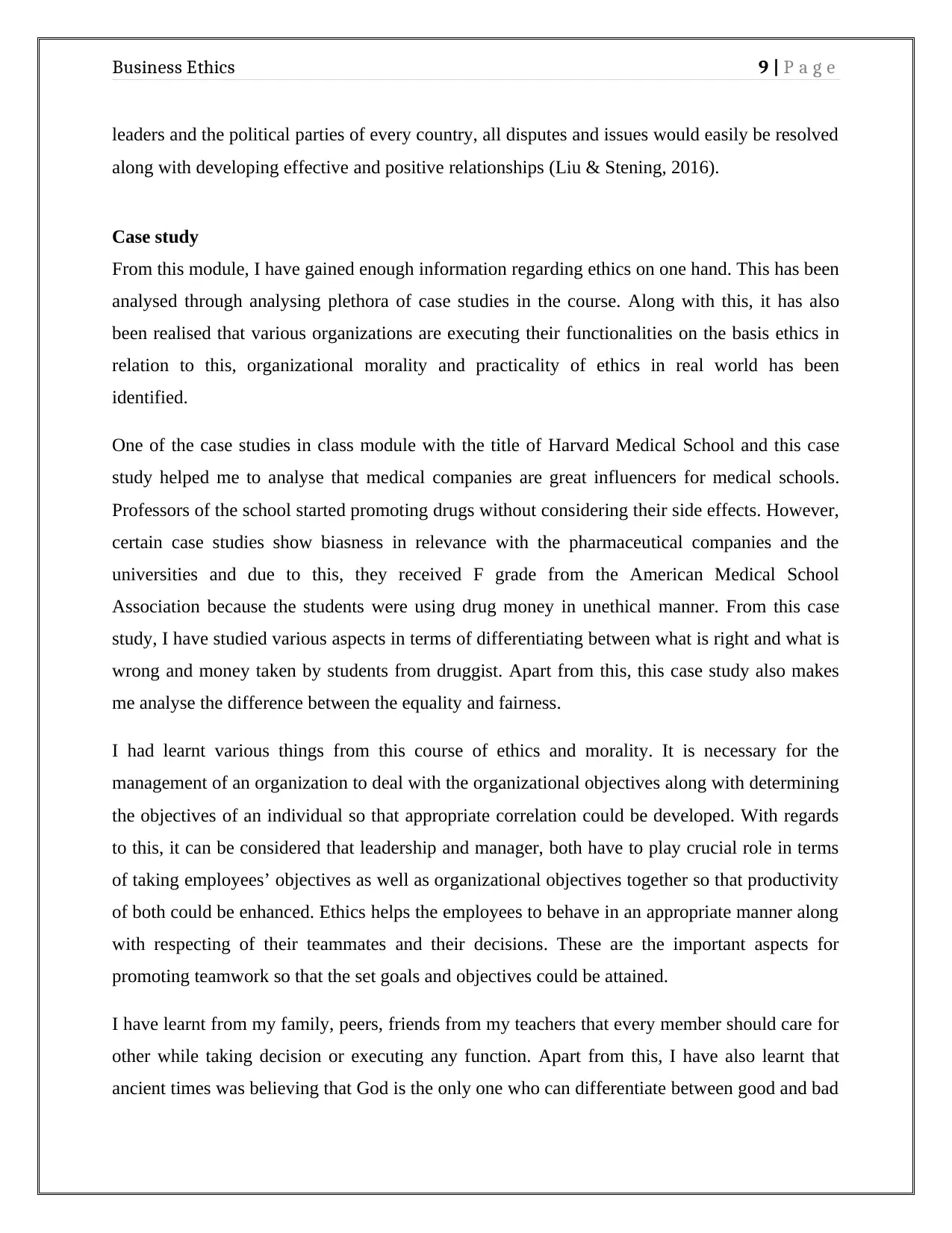
Business Ethics 9 | P a g e
leaders and the political parties of every country, all disputes and issues would easily be resolved
along with developing effective and positive relationships (Liu & Stening, 2016).
Case study
From this module, I have gained enough information regarding ethics on one hand. This has been
analysed through analysing plethora of case studies in the course. Along with this, it has also
been realised that various organizations are executing their functionalities on the basis ethics in
relation to this, organizational morality and practicality of ethics in real world has been
identified.
One of the case studies in class module with the title of Harvard Medical School and this case
study helped me to analyse that medical companies are great influencers for medical schools.
Professors of the school started promoting drugs without considering their side effects. However,
certain case studies show biasness in relevance with the pharmaceutical companies and the
universities and due to this, they received F grade from the American Medical School
Association because the students were using drug money in unethical manner. From this case
study, I have studied various aspects in terms of differentiating between what is right and what is
wrong and money taken by students from druggist. Apart from this, this case study also makes
me analyse the difference between the equality and fairness.
I had learnt various things from this course of ethics and morality. It is necessary for the
management of an organization to deal with the organizational objectives along with determining
the objectives of an individual so that appropriate correlation could be developed. With regards
to this, it can be considered that leadership and manager, both have to play crucial role in terms
of taking employees’ objectives as well as organizational objectives together so that productivity
of both could be enhanced. Ethics helps the employees to behave in an appropriate manner along
with respecting of their teammates and their decisions. These are the important aspects for
promoting teamwork so that the set goals and objectives could be attained.
I have learnt from my family, peers, friends from my teachers that every member should care for
other while taking decision or executing any function. Apart from this, I have also learnt that
ancient times was believing that God is the only one who can differentiate between good and bad
leaders and the political parties of every country, all disputes and issues would easily be resolved
along with developing effective and positive relationships (Liu & Stening, 2016).
Case study
From this module, I have gained enough information regarding ethics on one hand. This has been
analysed through analysing plethora of case studies in the course. Along with this, it has also
been realised that various organizations are executing their functionalities on the basis ethics in
relation to this, organizational morality and practicality of ethics in real world has been
identified.
One of the case studies in class module with the title of Harvard Medical School and this case
study helped me to analyse that medical companies are great influencers for medical schools.
Professors of the school started promoting drugs without considering their side effects. However,
certain case studies show biasness in relevance with the pharmaceutical companies and the
universities and due to this, they received F grade from the American Medical School
Association because the students were using drug money in unethical manner. From this case
study, I have studied various aspects in terms of differentiating between what is right and what is
wrong and money taken by students from druggist. Apart from this, this case study also makes
me analyse the difference between the equality and fairness.
I had learnt various things from this course of ethics and morality. It is necessary for the
management of an organization to deal with the organizational objectives along with determining
the objectives of an individual so that appropriate correlation could be developed. With regards
to this, it can be considered that leadership and manager, both have to play crucial role in terms
of taking employees’ objectives as well as organizational objectives together so that productivity
of both could be enhanced. Ethics helps the employees to behave in an appropriate manner along
with respecting of their teammates and their decisions. These are the important aspects for
promoting teamwork so that the set goals and objectives could be attained.
I have learnt from my family, peers, friends from my teachers that every member should care for
other while taking decision or executing any function. Apart from this, I have also learnt that
ancient times was believing that God is the only one who can differentiate between good and bad
Paraphrase This Document
Need a fresh take? Get an instant paraphrase of this document with our AI Paraphraser
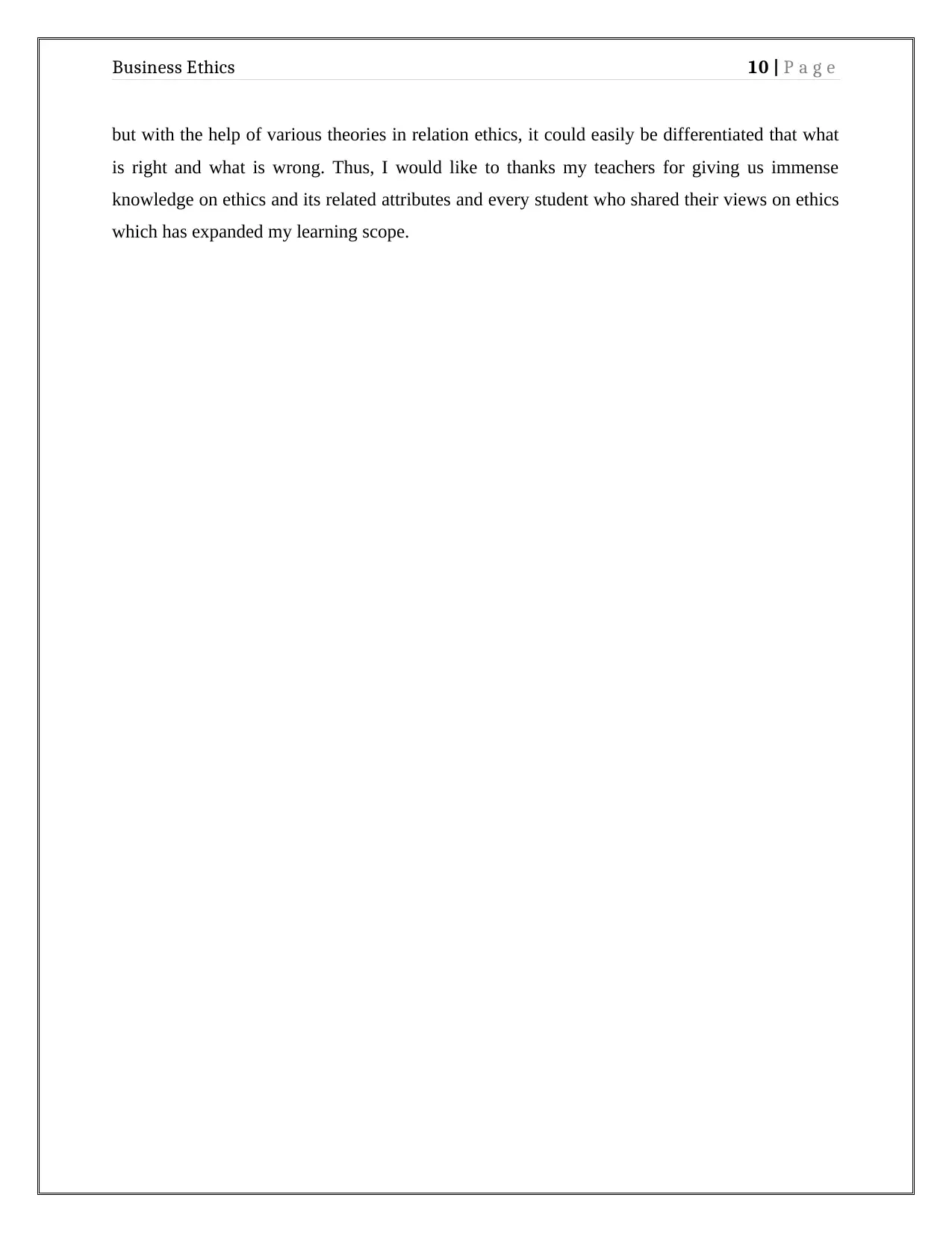
Business Ethics 10 | P a g e
but with the help of various theories in relation ethics, it could easily be differentiated that what
is right and what is wrong. Thus, I would like to thanks my teachers for giving us immense
knowledge on ethics and its related attributes and every student who shared their views on ethics
which has expanded my learning scope.
but with the help of various theories in relation ethics, it could easily be differentiated that what
is right and what is wrong. Thus, I would like to thanks my teachers for giving us immense
knowledge on ethics and its related attributes and every student who shared their views on ethics
which has expanded my learning scope.
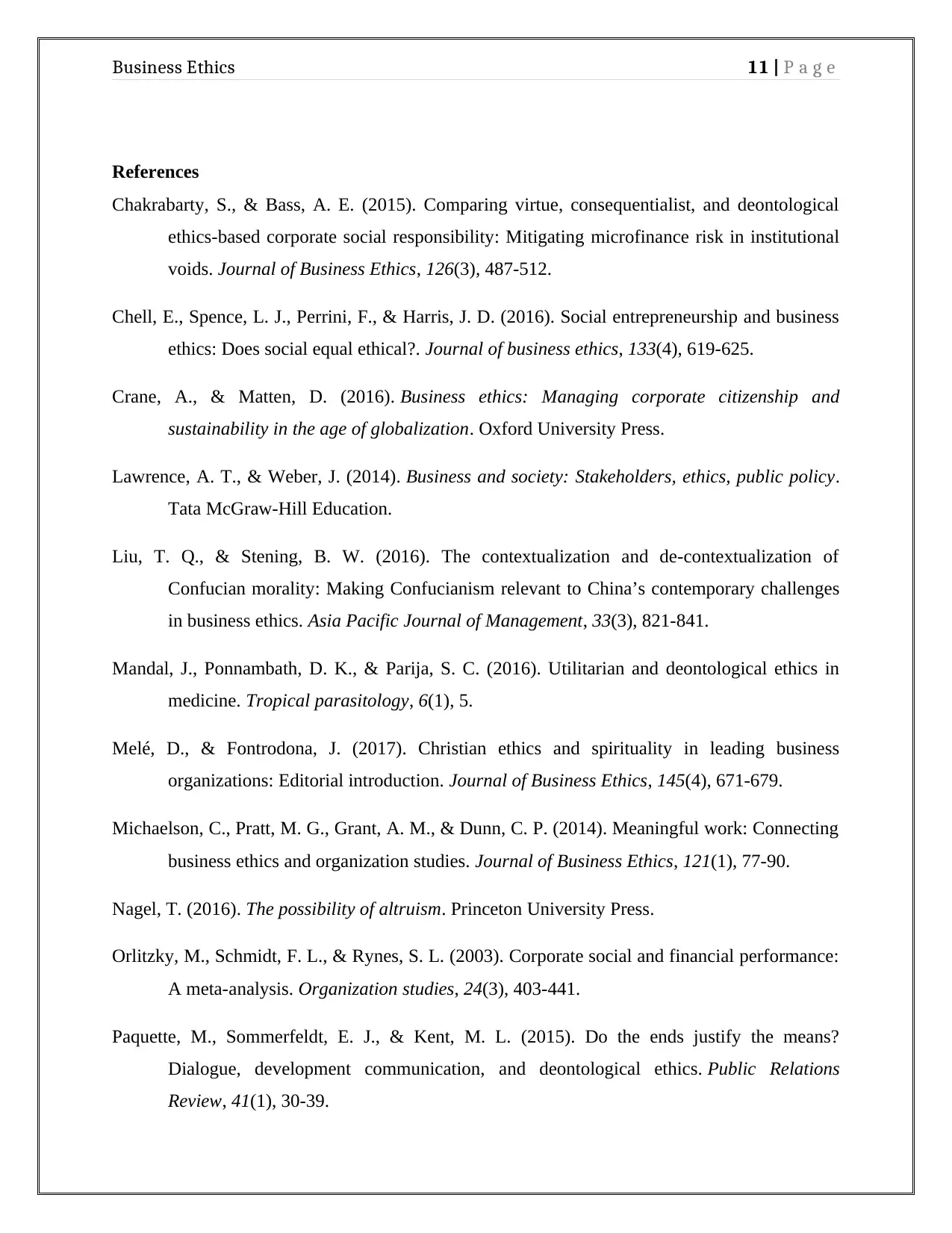
Business Ethics 11 | P a g e
References
Chakrabarty, S., & Bass, A. E. (2015). Comparing virtue, consequentialist, and deontological
ethics-based corporate social responsibility: Mitigating microfinance risk in institutional
voids. Journal of Business Ethics, 126(3), 487-512.
Chell, E., Spence, L. J., Perrini, F., & Harris, J. D. (2016). Social entrepreneurship and business
ethics: Does social equal ethical?. Journal of business ethics, 133(4), 619-625.
Crane, A., & Matten, D. (2016). Business ethics: Managing corporate citizenship and
sustainability in the age of globalization. Oxford University Press.
Lawrence, A. T., & Weber, J. (2014). Business and society: Stakeholders, ethics, public policy.
Tata McGraw-Hill Education.
Liu, T. Q., & Stening, B. W. (2016). The contextualization and de-contextualization of
Confucian morality: Making Confucianism relevant to China’s contemporary challenges
in business ethics. Asia Pacific Journal of Management, 33(3), 821-841.
Mandal, J., Ponnambath, D. K., & Parija, S. C. (2016). Utilitarian and deontological ethics in
medicine. Tropical parasitology, 6(1), 5.
Melé, D., & Fontrodona, J. (2017). Christian ethics and spirituality in leading business
organizations: Editorial introduction. Journal of Business Ethics, 145(4), 671-679.
Michaelson, C., Pratt, M. G., Grant, A. M., & Dunn, C. P. (2014). Meaningful work: Connecting
business ethics and organization studies. Journal of Business Ethics, 121(1), 77-90.
Nagel, T. (2016). The possibility of altruism. Princeton University Press.
Orlitzky, M., Schmidt, F. L., & Rynes, S. L. (2003). Corporate social and financial performance:
A meta-analysis. Organization studies, 24(3), 403-441.
Paquette, M., Sommerfeldt, E. J., & Kent, M. L. (2015). Do the ends justify the means?
Dialogue, development communication, and deontological ethics. Public Relations
Review, 41(1), 30-39.
References
Chakrabarty, S., & Bass, A. E. (2015). Comparing virtue, consequentialist, and deontological
ethics-based corporate social responsibility: Mitigating microfinance risk in institutional
voids. Journal of Business Ethics, 126(3), 487-512.
Chell, E., Spence, L. J., Perrini, F., & Harris, J. D. (2016). Social entrepreneurship and business
ethics: Does social equal ethical?. Journal of business ethics, 133(4), 619-625.
Crane, A., & Matten, D. (2016). Business ethics: Managing corporate citizenship and
sustainability in the age of globalization. Oxford University Press.
Lawrence, A. T., & Weber, J. (2014). Business and society: Stakeholders, ethics, public policy.
Tata McGraw-Hill Education.
Liu, T. Q., & Stening, B. W. (2016). The contextualization and de-contextualization of
Confucian morality: Making Confucianism relevant to China’s contemporary challenges
in business ethics. Asia Pacific Journal of Management, 33(3), 821-841.
Mandal, J., Ponnambath, D. K., & Parija, S. C. (2016). Utilitarian and deontological ethics in
medicine. Tropical parasitology, 6(1), 5.
Melé, D., & Fontrodona, J. (2017). Christian ethics and spirituality in leading business
organizations: Editorial introduction. Journal of Business Ethics, 145(4), 671-679.
Michaelson, C., Pratt, M. G., Grant, A. M., & Dunn, C. P. (2014). Meaningful work: Connecting
business ethics and organization studies. Journal of Business Ethics, 121(1), 77-90.
Nagel, T. (2016). The possibility of altruism. Princeton University Press.
Orlitzky, M., Schmidt, F. L., & Rynes, S. L. (2003). Corporate social and financial performance:
A meta-analysis. Organization studies, 24(3), 403-441.
Paquette, M., Sommerfeldt, E. J., & Kent, M. L. (2015). Do the ends justify the means?
Dialogue, development communication, and deontological ethics. Public Relations
Review, 41(1), 30-39.
⊘ This is a preview!⊘
Do you want full access?
Subscribe today to unlock all pages.

Trusted by 1+ million students worldwide
1 out of 13
Related Documents
Your All-in-One AI-Powered Toolkit for Academic Success.
+13062052269
info@desklib.com
Available 24*7 on WhatsApp / Email
![[object Object]](/_next/static/media/star-bottom.7253800d.svg)
Unlock your academic potential
Copyright © 2020–2026 A2Z Services. All Rights Reserved. Developed and managed by ZUCOL.




